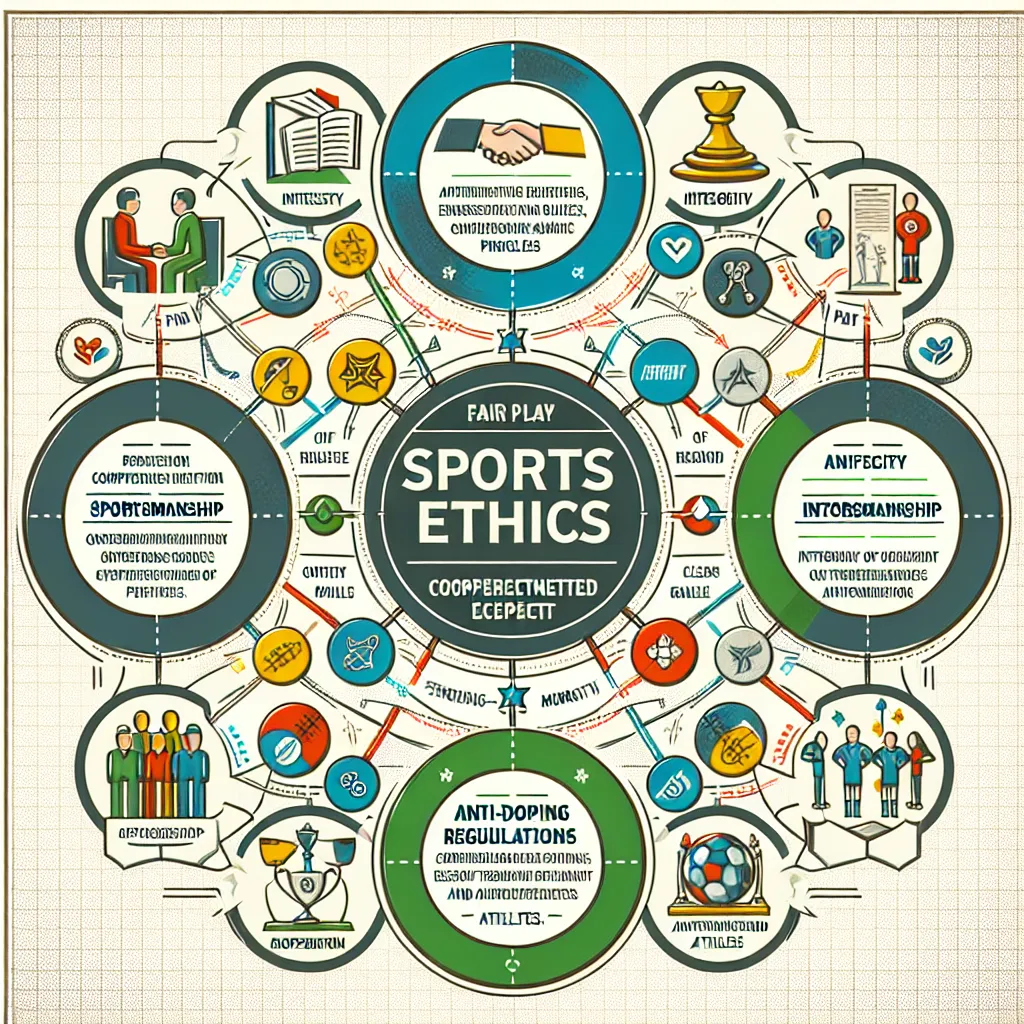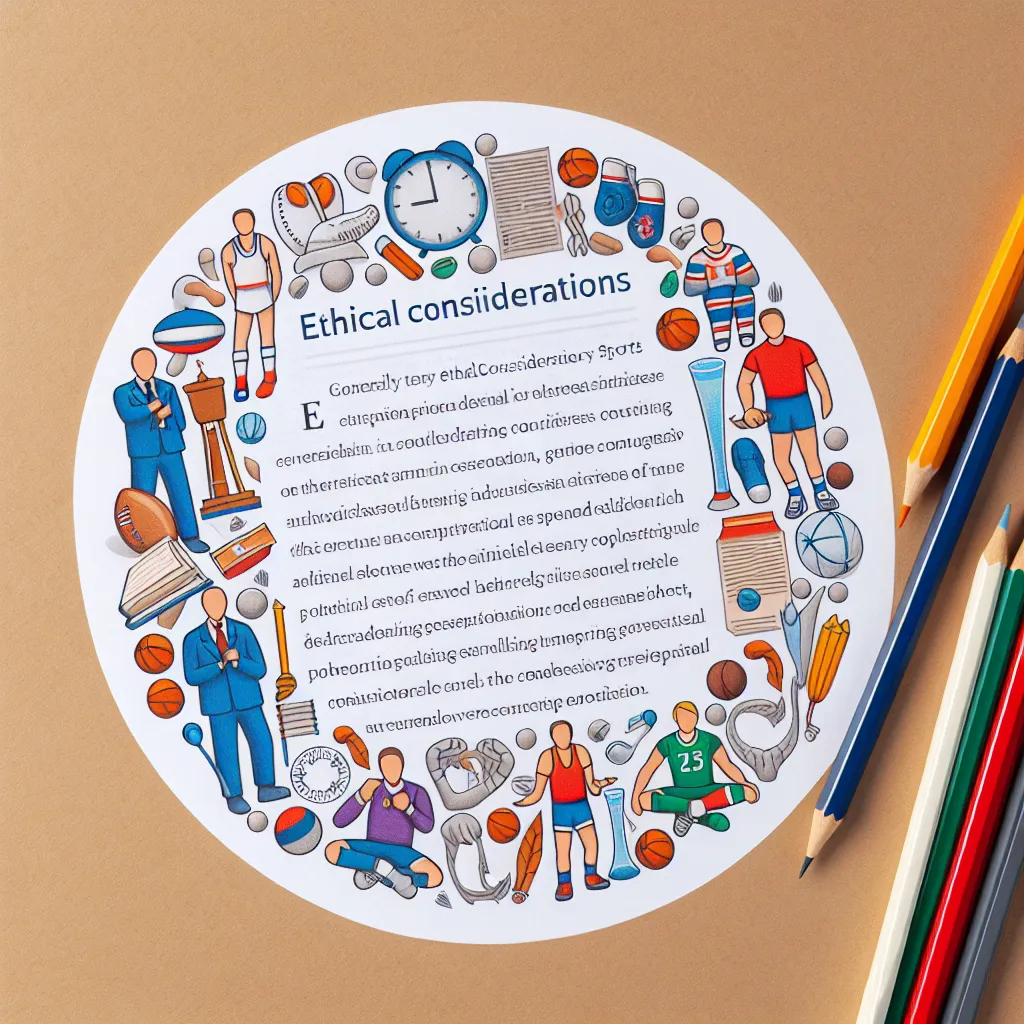Sports ethics is a crucial topic in the world of athletics and a common theme in IELTS exams. Understanding the vocabulary associated with this concept can significantly boost your performance in the test. Let’s dive into the key terms and phrases you need to know to excel in discussions about sports ethics.
Nội dung bài viết
Defining Sports Ethics
Sports ethics refers to the moral principles and values that guide behavior in athletic competitions and related activities. It encompasses concepts of fair play, sportsmanship, and integrity within the sporting world.
- Part of speech: Noun phrase
- Pronunciation: /spɔːrts ˈeθɪks/
 Sports Ethics Concept Diagram
Sports Ethics Concept Diagram
Context and Usage
Let’s examine some examples of how “sports ethics” is used in context:
-
The International Olympic Committee emphasizes the importance of sports ethics in maintaining the integrity of the Games.
Analysis: This sentence demonstrates how sports ethics is crucial at the highest levels of athletic competition. -
The university’s athletics department offers a course on sports ethics to educate student-athletes about fair play and ethical decision-making.
Analysis: Here, we see the educational aspect of sports ethics, highlighting its role in shaping future athletes’ behavior. -
The cyclist’s decision to report his teammate’s use of performance-enhancing drugs was a difficult choice, but ultimately aligned with the principles of sports ethics.
Analysis: This example illustrates how sports ethics can influence individual decisions in real-world scenarios. -
Debates about sports ethics often arise when discussing the use of technology in officiating decisions.
Analysis: This sentence shows how sports ethics extends beyond athlete behavior to include broader issues in sports management and officiating. -
The sports commission launched a new initiative to promote sports ethics among youth athletes, focusing on values such as respect, teamwork, and honesty.
Analysis: This example highlights the importance of instilling ethical principles in young athletes early in their careers.
Sports ethics is frequently discussed in IELTS Speaking and Writing tasks, particularly in Task 2 essays where candidates might be asked to express opinions on fair play in sports or the role of ethics in athletic competition.
Vocabulary Analysis
Related Terms and Phrases
-
Fair play
- Part of speech: Noun phrase
- Pronunciation: /feər pleɪ/
- Definition: Respect for the rules and equal treatment of all competitors in a sport.
-
Sportsmanship
- Part of speech: Noun
- Pronunciation: /ˈspɔːrtsmənʃɪp/
- Definition: Ethical, appropriate, polite and fair behavior while participating in a sport or athletic event.
-
Integrity
- Part of speech: Noun
- Pronunciation: /ɪnˈteɡrəti/
- Definition: The quality of being honest and having strong moral principles in sports.
-
Doping
- Part of speech: Noun
- Pronunciation: /ˈdoʊpɪŋ/
- Definition: The use of banned athletic performance-enhancing drugs by athletic competitors.
-
Anti-doping regulations
- Part of speech: Noun phrase
- Pronunciation: /ˌænti ˈdoʊpɪŋ ˌreɡjuˈleɪʃənz/
- Definition: Rules and guidelines designed to prevent the use of prohibited substances in sports.
Synonyms and Antonyms
Synonyms for “sports ethics”:
- Athletic integrity
- Sports morality
- Fair play principles
- Ethical sportsmanship
Antonyms or concepts opposed to “sports ethics”:
- Cheating in sports
- Unsportsmanlike conduct
- Dishonesty in athletics
- Ethical misconduct in sports
Memorization Techniques
Mind Mapping
Create a mind map with “Sports Ethics” at the center, branching out to related concepts such as:
- Fair Play
- Integrity
- Sportsmanship
- Anti-Doping
- Respect for Rules
- Ethical Decision-Making
Storytelling Technique
Imagine a young athlete facing a moral dilemma: they discover their teammate using performance-enhancing drugs before a crucial match. The athlete must decide whether to report the violation, risking team harmony, or stay silent, compromising their own ethical standards. This scenario encapsulates various aspects of sports ethics, including integrity, fair play, and the consequences of ethical decision-making.
Practice Exercises
-
Writing Task: Compose a paragraph discussing the importance of sports ethics in modern athletics. Use at least three related terms from the vocabulary list above.
-
Speaking Practice: Prepare a 2-minute talk on the following topic: “Do you think sports ethics are becoming more or less important in today’s competitive environment? Why?”
-
Reading Comprehension: Read an article on a recent sports ethics controversy and summarize the key ethical issues involved. You can find relevant articles on the IELTS.net fair play page.
-
Listening Exercise: Watch a video debate on sports ethics and note down the main arguments presented by each side. Pay attention to the specific vocabulary used in the discussion.
-
Essay Outline: Create an outline for an IELTS Writing Task 2 essay on the following prompt: “Some people believe that professional athletes have a responsibility to be role models in terms of ethical behavior. To what extent do you agree or disagree?”
 IELTS Writing Task Sample
IELTS Writing Task Sample
Conclusion
Mastering the vocabulary related to sports ethics is essential for success in the IELTS exam, particularly for tasks that involve discussing fair play, integrity in athletics, and ethical dilemmas in sports. By understanding and effectively using terms like “fair play,” “sportsmanship,” and “anti-doping regulations,” you’ll be well-equipped to express your ideas clearly and convincingly.
Remember to practice using these terms in context, whether you’re writing essays, participating in speaking exercises, or analyzing reading passages. The more you engage with this vocabulary, the more natural and fluent your use of it will become.
We encourage you to share your experiences with learning and using sports ethics vocabulary in the comments below. What challenges have you faced, and what strategies have you found most helpful? Your insights could be valuable to other IELTS candidates preparing for the exam.
For more information on ethics in sports and how it relates to IELTS preparation, check out our comprehensive guide on ethics in sports.


